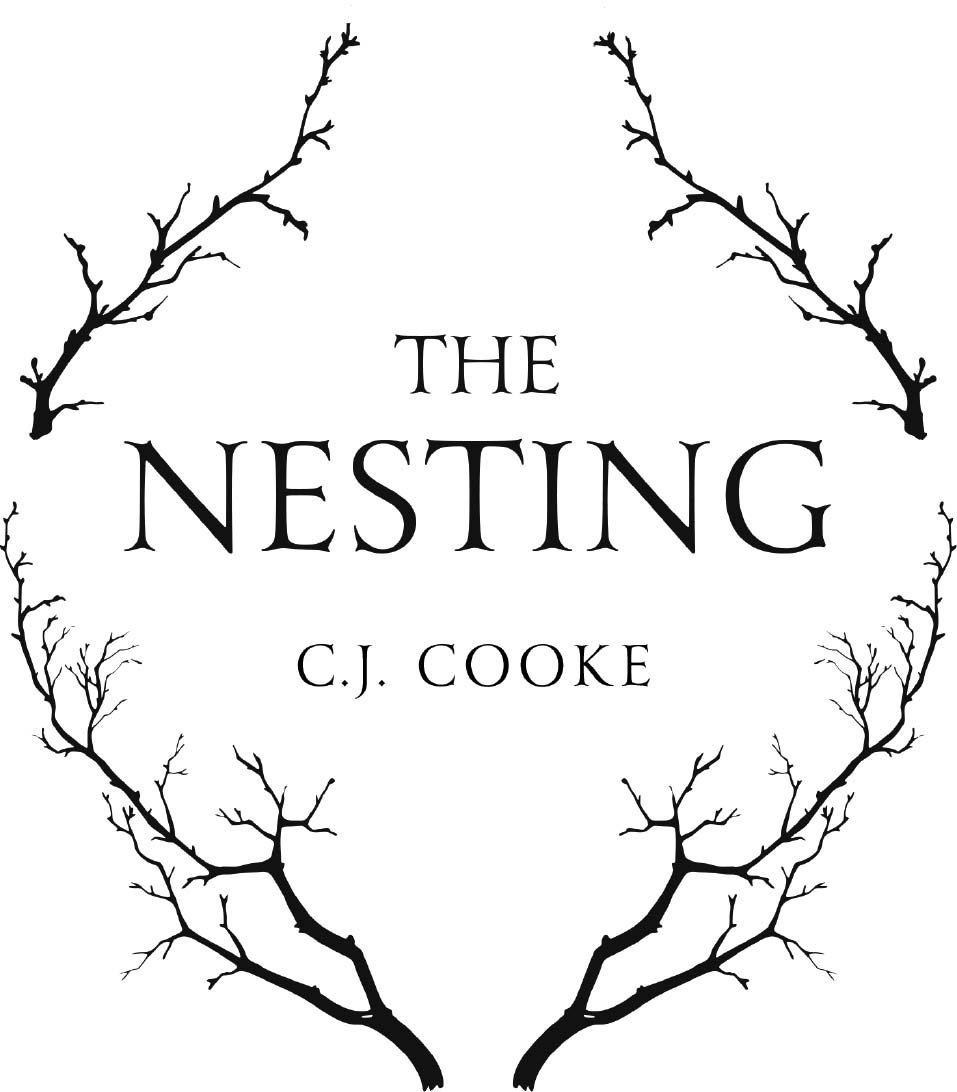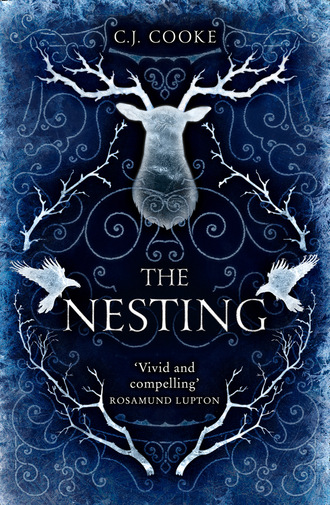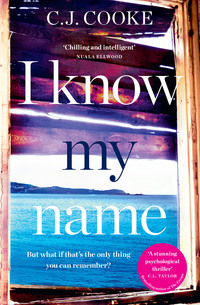


Copyright
Published by HarperCollinsPublishers Ltd
1 London Bridge Street
London SE1 9GF
www.harpercollins.co.uk
First published in Great Britain by HarperCollinsPublishers 2020
Copyright © C.J. Cooke 2020
Jacket Photographs: Cover Images © Shutterstock.com
Cover design by Andrew Davis © HarperCollinsPublishers Ltd 2020
C.J. Cooke asserts the moral right to be identified as the author of this work.
A catalogue copy of this book is available from the British Library.
This novel is entirely a work of fiction. The names, characters and incidents portrayed in it are the work of the author’s imagination. Any resemblance to actual persons, living or dead, events or localities is entirely coincidental.
All rights reserved under International and Pan-American Copyright Conventions. By payment of the required fees, you have been granted the non-exclusive, non-transferable right to access and read the text of this e-book on screen. No part of this text may be reproduced, transmitted, down-loaded, decompiled, reverse engineered, or stored in or introduced into any information storage and retrieval system, in any form or by any means, whether electronic or mechanical, now known or hereinafter invented, without the express written permission of HarperCollins.
Source ISBN: 9780008341862
Ebook Edition © 2020 ISBN: 9780008341886
Version: 2020-09-02
Acclaim for The Nesting
‘Norwegian fjords and folktales are beautifully evoked in this vivid and compelling novel’
Rosamund Lupton
‘It has been such a tonic – chilling, totally engrossing and full of intrigue. The pages just whizzed by while I ignored everyone! It’s marvellous’
Katherine May
‘Nordic folklore, snowy landscapes, and an ever-turning screw of tension – a fun, gothic treat’
Kirsty Logan
‘The Nesting is a gorgeous, atmospheric book that chilled me to the bone. The perfect escape book into the deep woods of Norway, where nothing is as it seems. C.J. Cooke just became one of my favourite authors’
Samantha Downing
‘An original and haunting thriller, filled with secrets, ghosts, and Norse folk-tales. The Nesting is an evocative and chilling tale that will keep you guessing, and is best read with the lights on’
Alice Feeney
‘The Nesting is an intriguing mix of gothic drama and domestic noir’
Sophie Draper
‘A taut, scary thriller that winds the suspense so tightly you can barely breathe’
Simone St. James
‘The Nesting is at once a taut psychological thriller, an eerie Nordic fable, and a thoughtful meditation on stewardship – not only of children, but of friendship, of truth, and of the natural world we take for granted at our peril. Ms. Cooke tells her story with a spare, elegant prose that betrays a poet’s ear, and also a poet’s discipline. The language is beautiful, but effortlessly so, pushing the story forward in two deftly handled timelines. The characters are heart-breakingly three-dimensional, yet tell us only what we need to know when we need to know it. This is my favourite kind of book – a quick read with a long echo’
Christopher Buehlman
Dedication
For
Jared & Phoenix
Epigraph
Once upon a time there was a river who, like all rivers, knew exactly where she wished to go. Some people willed her to change her course, and when she did not bend to their will, they began to tear her apart, pebble by pebble, stone by stone.
Of course, the river won in the end, and returned to her route with a wet sigh of relief, running the length of her spine against the familiar grey rocks and stretching luxuriantly against the grooves of earth she had known for centuries.
And she made sure that the people paid dearly for their foolishness.
from P. Johansen’s Book of Remembered Norse Folk Tales, 1999
(trans. A. Faraday)
Contents
Cover
Title Page
Copyright
Acclaim for The Nesting
Dedication
Epigraph
Prologue
Chapter 1: Endless Dark
Chapter 2: Hauled in by the Throat
Chapter 3: A Place to Stay
Chapter 4: The Nanny
Chapter 5: Building a Nest
Chapter 6: A Home or a Nest
Chapter 7: Are You Going to Die?
Chapter 8: The River
Chapter 9: Is There Something You’re not Telling Me?
Chapter 10: The Hole You Left
Chapter 11: The Felling
Chapter 12: This is a Sign
Chapter 13: Would You Return?
Chapter 14: She Who is Missed Most
Chapter 15: The Bottom of the Earth
Chapter 16: The Cliff and the Forest and the Beasts
Chapter 17: Words that Boil, Wounds that Burn
Chapter 18: The Attic
Chapter 19: The Lift
Chapter 20
Chapter 21: Foreign Agents
Chapter 22: It Didn’t add Up
Chapter 23: Someone else Knows
Chapter 24: The Drill
Chapter 25: The Turning Point
Chapter 26: I Saw Her Swimming
Chapter 27
Chapter 28: The Suspects
Chapter 29: The Discovery
Chapter 30: The Murder of Ingrid Olsen
Chapter 31: The Crossing
Chapter 32: The Discovery
Chapter 33: No Longer Needed
Chapter 34: You Want this
Chapter 35: Different Storms
Chapter 36: The Note
Chapter 37: Curiosity and Suspicion
Chapter 38: She was Mine
Chapter 39: Did You Do It?
Chapter 40: The Choice
Chapter 41: The Guest
Acknowledgements
Author Note
Keep Reading …
About the Author
Also by C.J. Cooke
About the Publisher


Prologue
Aurelia sprints through the dark forest, her white nightdress billowing like a cloud, her strides long and swift across the carpet of bark and brambles. She tries not to think too much about how the towering silver birches resemble skeletons, moonlight transforming the silvery trunks into endless prison bars and the weeping sky soaking her to the bone.
Her breaths come in quick, frantic gasps, her lungs ache and her feet bleed, but he is tearing after her and he will do much, much worse to her than the forest, or the thing in the house. He will hurt the babies, Gaia and Coco, and she will do absolutely anything to protect them. She has to draw him away from them, as far as she can. For good, this time.
So she powers downhill, her heart trying to climb into her mouth and her mind churning like a river wheel, though she knows there is no way she can outrun him for long, and there is no one to call in the wilderness that spreads for miles on end all around.
She takes the trail towards the cliff where a drop of two hundred feet connects the south end of a sapphire fjord to muscular granite. Her mind splits into two voices, one that tells her yes, this is the only way, the only option, and the other that shouts at her to turn back, it’s crazy, utterly crazy.
She reaches the cliff edge sooner than she’d anticipated. Her toes feel the rush of icy air at the end of the path and she has to wrap her arms around an oak tree to stop herself from tumbling off the end.
She can hear the thud of his feet fifty feet behind. She has only seconds to decide. The risk is enormous. It isn’t the thought of dying that brings a sob to her throat. It’s the girls. Gaia and Coco. Growing up without her.
She sees them in her mind, two bright angels. Even when she feels him grow closer she holds on to that vision and imagines reaching out to them, taking their hands.
Come on, Mumma! Hold on tight!
With a snarl he lunges at her, and quickly she darts out of his way, letting him plunge headlong towards the edge of the cliff where there is nothing but night separating rock and water, life and certain death.
But his shoulder collides with hers, and although she reaches out to take her daughters’ hands, her feet lift and she falls down, down into the endless dark.


ENDLESS DARK
Now
Meg was the one who found me slumped against the bathroom wall with red pouring out of my arms. I could make out what she was saying though it sounded like we were underwater. Oh no, oh no. Lexi! What the hell have you done, Lexi?
She crouched in front of me and I wanted to tell her not to because she was going to ruin her lovely yellow skirt by kneeling in my blood. Also there was glass on the floor from the mirror I’d smashed and I’d feel awful if she cut herself.
She grabbed some towels, wrapped them around my arms and started to cry when she couldn’t tie them tight enough. Have you ever tried to tie a knot in a towel? Really difficult, it turns out.
Meg dialled 999 on her phone. By this stage I was swooping in and out of consciousness – I’d taken a fistful of paracetamol, just in case – and I could no longer decipher between reality and hallucination, which is always fine by me as long as neither is threatening. They must have hoiked me down the stairs and into the ambulance, but I don’t remember any of this. I woke up in the hospital a few hours later, puking my guts up. I’ve no idea what they gave me, but it was efficient in wringing me out. They stitched me up, masked the cuts with padded dressings.
Meg came back the next day and brought me lunch in a brown paper bag and looked tearful when I said I couldn’t touch it. David came and I immediately felt guilty again for being a burden on him. He said, ‘I had to use annual leave to come see you. What happened? Why are you here, Lex?’
I had no answer. I wondered if he’d had to clean up the blood. David was always squeamish.
A doctor came along, stood beside my bed with his hands in his pockets.
‘Lexi, before we send you home we need to be sure you won’t do this again. We need you to sign a form saying that you have no more plans to harm yourself.’
He produced a form. I signed it. I took the bus home.
On the phone my mother said that I was always an attention seeker. I read somewhere that those who get under our skin are our best teachers, and while it sticks in me to call my mother a teacher of any kind, I’ll say that her comment inadvertently sparked an epiphany, because even as she moved on to give me a blow-by-blow account of that morning’s Jeremy Kyle, I realized that she was part of the reason I’d tried to top myself. And secondly, I realized that if I was to stay alive, I should probably stop speaking to her altogether.
I lost my job. I was working as an administrator at a care home and took a month off to recover. I didn’t get a sick note, so they sacked me. It was probably illegal, but the thing with illness, mental or otherwise, is that it tends to annihilate your capacity for argument. At the time I was spending twenty-three hours a day in bed. For the first few weeks I mostly slept, though I had such psychedelic nightmares that it wasn’t exactly restful. Dreams about my childhood, about my mother telling me she wished I’d never been born. Dreams of being shipped out to strangers while she ‘sorted herself out’.
David didn’t say much to me during this time. He went out to work every morning, sent me a text at lunchtime, and then came home at dinner time with a ready meal or takeout. I didn’t eat much. He’d sit in bed beside me marking homework assignments while I tried to follow Game of Thrones. When the cuts healed I started sleeping less, and the fear set in again. I asked David if I could go to work with him and he looked at me like I’d suggested he get a full body wax.
‘Come to work with me? What for?’
I didn’t want to say I was lonely at home. ‘Because I’m lonely at home.’
‘Go back to work, then.’
‘They sacked me, remember?’
‘Can’t you just look for a new job?’
‘I could sit in the staffroom and read.’
‘You can’t do that …’
‘Why not?’
‘It would be weird, Lexi. You know it would.’
‘Maybe the caretaker’s cupboard.’
‘The what?’
‘Don’t schools still have those? Mine did.’
‘Look, I’ll FaceTime you.’
He didn’t FaceTime me.
I went to the public library but it was too loud. People were staring and it felt like being branded with hot irons. The books were full of stories that shouted at me and I worried they might fly off the shelves and hit me. Difficult to explain these kinds of things when a librarian is leaning over you asking why you’re hyperventilating on the floor.
So I went home, opened my laptop, and started to write. I wrote and wrote and wrote. It was like the story was being dictated to me. It was about a twenty-eight-year-old woman who had a nightmarish childhood due to her mother passing her around strangers who did terrible things to her, and the girl grew up to be an inventor and made millions and learned self-respect. Note the feminist angle. It was set in Norway. After my doomed trip to the public library, I realized I’d somehow managed to check out some novels, all of them whodunnits set in bleak, Nordic landscapes. Scandi noir. After I finished reading them I thought, that’s what my book is. I tweaked a few details and lo, a Scandi noir it became.
I knew David was going to break up with me. We’d been together eight years and the last six had been fairly rough going. He was like the Arctic. Impenetrable, cold, rugged. I used to find these qualities attractive. Or rather, I remembered the look on my mother’s face when she met him. She was all timid, couldn’t get her words out. He was middle class, which is a bit like saying he was from Middle Earth, wielding a sword that turned blue at the prospect of charging orcs. My mother finds middle-class people – or in other words, anyone with a mortgage – intimidating.
That was reason enough for me to move in with him.
Being dumped went far worse than I’d expected. I hadn’t really considered that the flat was technically David’s and that if we broke up I might end up homeless, but there it was. He came home and looked like he’d had a few drinks, and he said:
‘I can’t do this any more, Lexi. I can’t take it. You’re too much.’
I looked at what he was wearing – since when had he started wearing a shirt and tie? – and said, ‘Too much of what?’
‘Too much of you. We need to split. I’m sorry.’
We hugged. It seemed very amicable. I felt a small amount of pride in what ego I had left that here I was facing the first big milestone of adulthood – namely, the death of my first long-term relationship – and yet I was still managing to say things like ‘no, no, you’re right, it’s better that we stay friends, that’s the main thing’ instead of falling apart. I felt very fond of him right then, because at least he looked like he regretted us parting ways.
But the next morning, he was back to being the Arctic personified.
‘When are you moving out?’ he said, avoiding eye contact as he did his tie. Navy blue with white stripes. Very corporate.
I looked around at all my stuff strewn across the bedroom floor and spewing out of the chest of drawers. I had barely enough strength to make it to the toilet and back, never mind pack eight years’ worth of crap and organize a removal company. And a new home.
‘When do you want me to move out?’ I asked.
‘By next week, if that’s all right,’ he said, and I nodded as though this was a perfectly reasonable request. Note: I’d never done Breaking Up before, not when it involved moving out of my home. And I was on a daily 100 mg dose of an anti-psychotic that occasionally made the bread bin initiate a conversation.
Next week came. I got dressed. Jeans, white T-shirt, bottle-green cardi, and a laser-cut necklace that spelled out ‘protagonist’ in glossy black Helvetica. I filled a holdall with some random items I thought I might need – a tin opener, clean socks, the toaster – and made a packed lunch.
I had forty-one pounds and fifty-nine pence in my bank account. I eyed my wardrobe full of clothes, shoes, and Christmas presents, with trepidation. You might as well have asked me to dredge up the Titanic as ask me to find a way to pack all of it up. It didn’t occur to me to ask anyone for help. I’d put everyone through enough. I’d ruined Meg’s yellow skirt, and traumatized that poor librarian.
So I took my packed lunch and holdall and closed the door of the flat behind me, leaving my key on the table.
When I went outside it was raining. I didn’t have an umbrella. I had a coat, but no hood. This felt symbolic of my life up until that point. She had a coat, but lo, it had no hood.
I reached into my pocket in case I should find an unused poo bag from walking Mrs Hughes’s springer spaniel with which to shield my head against the downpour. No poo bag, but I did find David’s pre-paid rail pass. I’d found it in the hall and meant to give it to him, but the thought had trickled out of my head like a ribbon falling out of a ponytail.
At Newcastle I took a train headed to Birmingham New Street with lots of stops in between. I had no idea where I was going, and it didn’t matter, because the train was moving, and it was a mild comfort to be headed somewhere when my entire life had come to a complete stop. Plus, I was dry, and my arms ached from hoiking around the Tefal 4-slice stainless steel toaster that David had bought me for my last birthday.
The train was full of commuters. As ever I picked up on the cues of people’s lives – accounts spreadsheets, text messages flashing up on screens with evening plans and reminders to pick up milk, phone conversations about a colleague, or a sick aunt. I started to have those thoughts again, the ones that had persuaded me that I was already dead so it wouldn’t be a big deal if I committed suicide. It would be a relief, and everyone would benefit from it. I started to cry. No one paid any heed until my shoulders started bobbing up and down, and then a group of women gathered around me like hens and asked me what was wrong. I told them I’d broken up with my boyfriend.
‘Dear oh dear,’ one of them said, and another said, ‘Well, if you ask me, he sounds like a Grade A cockwomble,’ and they hugged me to their fleshy bosoms.
The train stopped at Durham. The hens told me I was pretty and young and didn’t need a man, and then they got off the train. I dabbed my eyes and kept my gaze fixed on the cathedral, on its sharp spires jabbing the bellies of clouds. Cars threaded through the streets and a smudge of kids played in a back garden. I envied their central heating and washing machines, the comfortable beds that they’d be able to climb into at the end of the day. I had none of that, now, and I had the sensation of being a tiny boat cut loose and drifting rapidly along a thrashing river with a waterfall thundering in the distance. To make matters worse, it occurred to me that I’d left my medication in David’s flat. I found my mobile phone in my bra and rang his number, but it didn’t connect. He had blocked me.
Panic started to stir in me like a thousand manic butterflies. What was I going to do? Where would I go?
I would end it.
That’s what I would do.
Properly, this time.
My own reflection came into view in the glass, and I jumped, thinking at first that a woman had somehow materialized on the other side of the window. But no, it was me. I barely recognized myself. It had been ages since I looked in a mirror – I deliberately avoided this because I hated myself so much – but there I was, looking back at myself.
My reflection had a surprising look of grit. She didn’t look nearly as awful as I felt. She was thin, yes, and her outgrown bob was messy, and she had dark circles under her eyes, but she looked like someone I’d like to talk to. Someone who would listen and not wait until it was their turn to offer an opinion.
My reflection said, You’re writing a book, remember? If you die, the book won’t get finished.
I remembered I’d promised myself that I’d finish writing this damn book. This untitled Scandi noir that was unfolding quite nicely, unlike my miserable life. I owed it to that book – to the little girl in the story, Alexa, who suffered so much – to tell the world her story.


HAULED IN BY THE THROAT
Now
The train filled with new passengers and started to pull out of Durham station. A couple of younger women sat in the seats in front with their backs to me, continuing a loud conversation about a job that one of them was applying for.
‘But Sophie, do you really want to go to Norway?’ the one in the blue top said.
My ears pricked up. Norway? My novel was set in Norway. Oslo, to be precise. All the other Scandi noir novels I’d read were set there, and the murderously-hostile-but-dramatic Nordic landscape felt very much like the inside of my brain. So in a way, although I’d never been to Norway, the place felt intriguingly familiar.
‘Well, not really,’ Sophie said, ‘but Lucia’s starting school and Philippa said she’ll only need me during the summer holidays. And that’s not enough, is it?’
‘Couldn’t you just get another job during the school term?’ Sophie’s friend countered. ‘And then nanny for Philippa during the summer hols?’
‘I’ve got my application all ready,’ Sophie said, flipping open her laptop and turning it to her friend. ‘All I have to do is click “send”.’
I could see it through the gap between the seats. I leaned forward and saw the white page of a PDF with boxes requesting information about previous employment and a large white section where Sophie had written a statement – in Comic Sans – about why she wanted the job. A sentence began ‘the wellbeing of children is my number one priority’, but I couldn’t make out the rest of it. Just then Sophie’s friend flicked her long black hair over one shoulder, obscuring my view.




